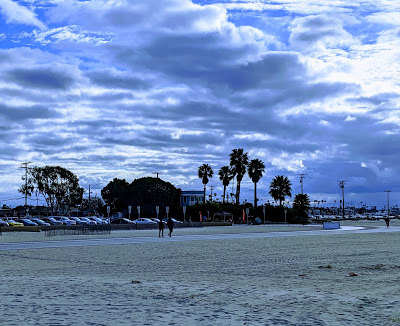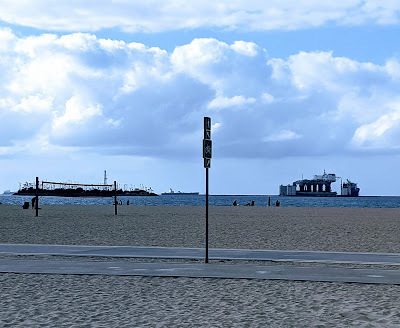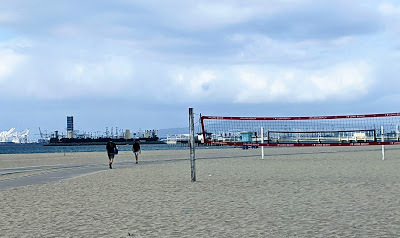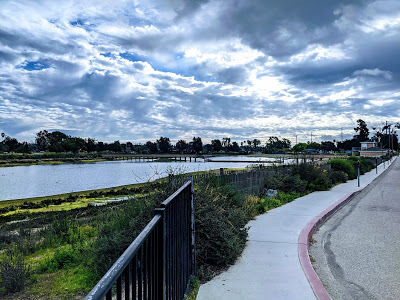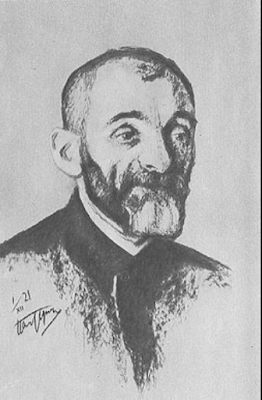R.L. Swihart's Blog, page 108
March 7, 2020
MORE BEACH PICS [3/7/20]
Published on March 07, 2020 14:41
Reading: Borges & Gogol
Jumped around a bit before landing on a reread of Borges' Greatest Hits (still reading). Something this week -- I believe it was the Russian Gogol Series, which I couldn't finish -- made me look into Gogol's early Ukrainian tales, and I ended up reading Viy. Not bad, certainly better than the series it inspired.
Published on March 07, 2020 14:33
March 1, 2020
Belmont Shore, CA [3/1/20]
Published on March 01, 2020 11:13
February 29, 2020
Colorado Lagoon @ Morning [Leap Day: 2/29/20]
Published on February 29, 2020 14:00
February 9, 2020
Shestov [2/9/20]
A quarter of a century has passed. So far nothing has happened in Europe. But we are drowning ourselves, literally drowning ourselves, with blood. Not only is our alien population oppressed, Slav and non-Slav alike, but our own brother is tortured, the miserable starving Russian peasant who understands nothing at all. In Moscow, in the heart of Russia, women, children, and old men have been shot down. Where now is the Russian universal soul of which Dostoevsky prophesied in his speech on Pushkin? Where is love, where are the Christian precepts? We see only 'Governmentalism,' over which the Western nations also fought; but they fought with means less cruel and less hostile to civilisation. Russia will again have to learn from the West as she had to learn more than once before. And Dostoevsky would have done far better had he never attempted to prophesy. But there is no great harm done even if he did prophesy. I am glad with all my heart even now that he rested a little while from the galleys at the end of his life. I am deeply convinced that even had he remained in the underworld until the day of his death, yet he would have found no solution of the questions which tormented him. However much energy of soul a man puts into his work, he will still remain 'on the eve' of truth, and will not find the solution he desires. That is the law of human kind.
*
There are but few orthodox Hegelians left among philosophers nowadays, yet Hegel is still supreme over the minds of our contemporaries. It may even be that certain of his ideas have taken deeper root nowadays than when Hegelianism was in full bloom: for instance, the conception that history is the unfolding of the idea in reality, or, to put it more briefly and in terms more familiar to the modern mind—the idea of progress. Try to convince an educated person of the contrary: you are sure to be worsted. But, de omnibus dubitandum, which means in other words, that doubt is called upon to fulfil its mission above all in those cases where a conviction is particularly strong and unshakable. Therefore one must admit, whether he will or no, that progress so called—the development of mankind in time—is a fiction.
*
That is the meaning of Turgeniev's senilia; that is the meaning of Ibsen's senilia. I have deliberately chosen the word senilia, though I might have said swan songs, though it would even have been more correct to speak of swan songs. 'Swans,' says Plato, 'when they feel the approach of death, sing that day better than ever, rejoicing that they will find God, whom they serve.' Ibsen and Turgeniev served the same God as the swans, according to the Greek belief, the bright God of songs, Apollo. And their last songs, their senilia, were better than all that had gone before. In them is a bottomless depth awful to the eye, but how wonderful! There all things are different from what they are with us on the surface. Should one hearken to the temptation and go to the call of the great old men, or should he tie himself to the mast of conviction, verified by the experience of mankind, and cover his ears as once the crafty Ulysses did to save himself from the Syrens? There is a way of escape: there is a word which will destroy the enchantment. I have already uttered it: senilia. Turgeniev wished to call his Prose Poems by this name—manifestations of sickness, of infirmity, of old age. These are terrible; one must run away from these! Schopenhauer, the philosopher and metaphysician, feared to revise the works of his youth in his old age. He felt that he would spoil them by his mere touch. And all men mistrust old age, all share Schopenhauer's apprehensions. But what if all are mistaken? What if senilia bring us nearer to the truth? Perhaps the soothsaying birds of Apollo grieve in unearthly anguish for another existence; perhaps their fear is not of death but of life; perhaps in Turgeniev's poems, as well as in Ibsen's last drama, are already heard, if not the last, then at least the penultimate words of mankind.
*
This course should be followed with other masters of wisdom and their doctrines. Then 'the other world' will not appear to be separated by such an abyss from our earthly vale. And perhaps, in spite of Kant, some empirical truths will be found common to both worlds. Then Pilate's question will lose much of its all-conquering certainty. He wished to wash his hands of the business, and he asked, 'What is truth?' After him and before him, many who had no desire to struggle have devised ingenious questions and taken their stand upon scepticism. But every one knows that truth does exist, and sometimes can even formulate its own conception with the clarity and precision demanded by Descartes. Is the miraculous bounded by the miracles that have already been seen on earth, or are its limits set much wider? And if wider, then how much?
Published on February 09, 2020 19:10
February 1, 2020
A Few New Poems Are Up At OTOLITHS
Four R L Swihart poems at OTOLITHS .
Published on February 01, 2020 12:36
Shestov on Chekhov
Left Zagajewski and have settled on some Shestov essays I found on Amazon. The first is on Chekhov. It's Shestov working on Chekhov. A sample:
To define his tendency in a word, I would say that Tchekhov was the poet of hopelessness. Stubbornly, sadly, monotonously, during all the years of his literary activity, nearly a quarter of a century long, Tchekhov was doing one thing alone: by one means or another he was killing human hopes.
*
There is no detailed biography of Tchekhov, and probably will never be, because there is no such thing as a full biography—I, at all events, cannot name one. Generally biographies tell us everything except what it is important to know. Perhaps in the future it will be revealed to us with the fullest details who was Tchekhov's tailor; but we shall never know what happened to Tchekhov in the time which elapsed between the completion of his story The Steppe and the appearance of his first drama. If we would know, we must rely upon his works and our own insight.
Published on February 01, 2020 12:28
Lev Shestov (Portrait by Leonid Pasternak, 1910)
Published on February 01, 2020 12:20
January 26, 2020
Zagajewski Clip (1/26/20)
I visited my father a few days ago. Although visit isn’t quite the right word, since he’s not present mentally. Not only does he not recognize me; I always come away with the impression that his gaze no longer retains concrete images, it doesn’t focus on any single object. My father lies in bed and sleeps for days on end. He’s still in his apartment, in his room, he’s well cared for. These visits are so sad. And once I fell into despair because he left without saying goodbye.
* * *
Cioran reports that Dylan Thomas was seized by convulsions and threw himself on the floor when someone once tried to interpret one of his poems in the poet’s presence.
* * *
Published on January 26, 2020 11:14
January 12, 2020
Zagajewski Clip (1/12/20)
Rue Servandoni, right by the Luxembourg Gardens. One of my favorite Parisian streets, or rather side streets; quiet, almost always empty. One building bears a plaque informing us that the Marquis Nicolas de Condorcet spent the last months of his life in hiding here; he’d been sentenced to death by the Revolution. In the end, he left his hiding place, was recognized, denounced, arrested, and shortly afterward died in prison under uncertain circumstances. In the months preceding his arrest he worked on his final project, Esquisse d’un tableau historique des progrès de l’esprit humain. The Revolution’s thugs were out to get him, and he writes on progress! He listened for footsteps echoing in the quiet side street, but retained his faith in progress. He kept one ear open for his persecutors’ footsteps, while the other heard the ever-advancing music of the future. He witnessed the terror unleashed by the Jacobins, but never lost his faith in human perfectibility. I don’t know what to admire more, the courage or the blindness of the philosopher hiding in a house on Servandoni Street.
Published on January 12, 2020 14:40



